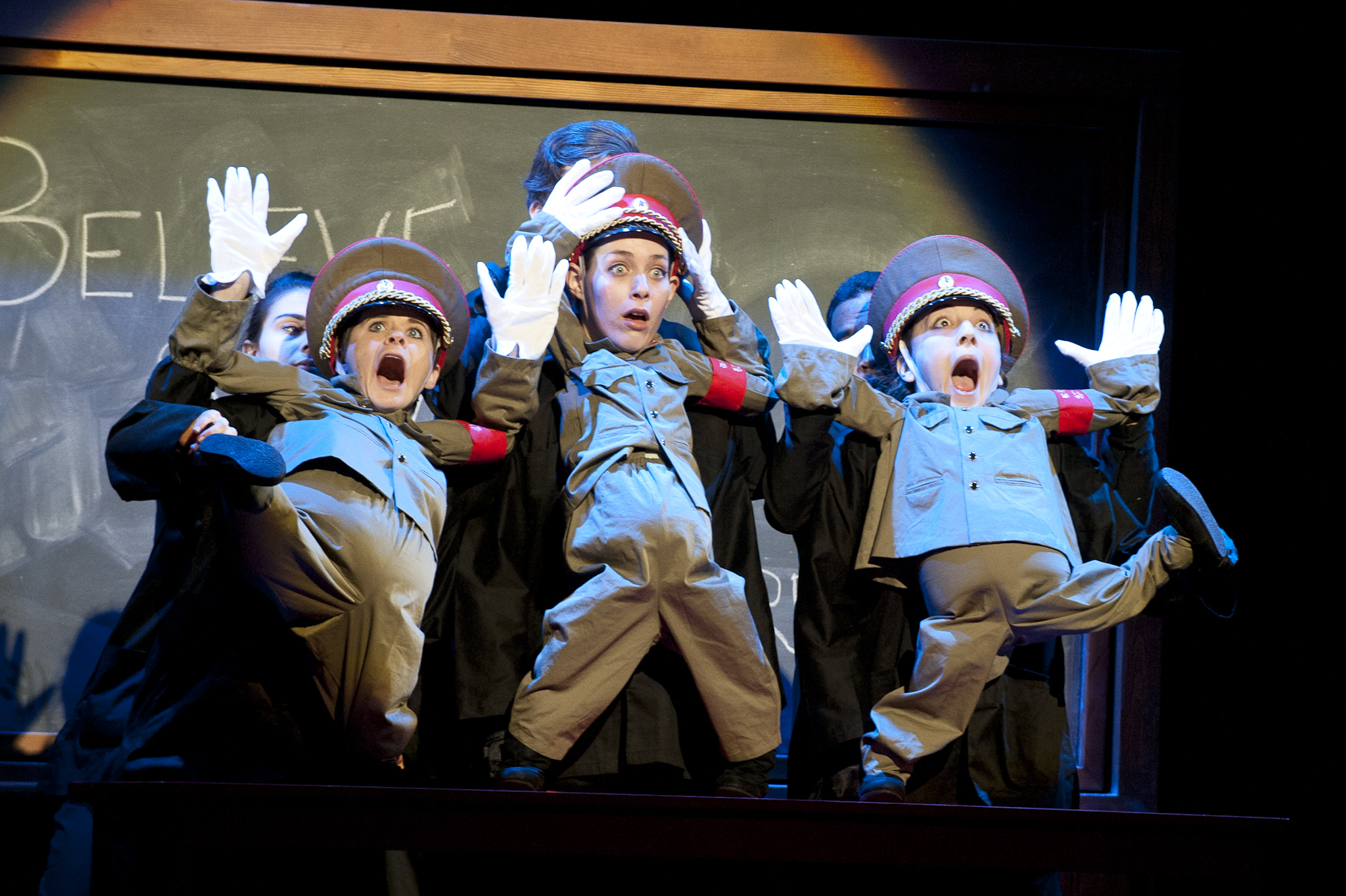Like Occupy Wall Street, Maxwell Davies’ new “protest” opera proves more noisy than effective

From left, Laura Mixter, Meredith Lustig and Rachael Wilson as officer puppets in Peter Maxwell Davies' opera "Kommilitonen!" which had its U.S. premiere Wednesday night at Juilliard. Photo: Nan Melville.
Exclamation points don’t normally make it into the titles of operas. They are more at home in the kind of speech that brooks no response: advertising, say, electioneering, or road rage. It is interesting, then, to find one in the title of Sir Peter Maxwell Davies’ new opera, Kommilitonen!, which had its U.S. premiere at Juilliard Wednesday night.
The word, meaning “fellow students,” is taken from the final leaflet the members of the German resistance group Die Weisse Rose distributed, shortly before they were arrested and executed for treason. When those leaflets fluttered through the marble atrium of the University of Munich in 1942, they were intended as a desperate wake-up call to Germans who turned a blind eye to Hitler’s atrocities.
Facsimiles of the same leaflets tumbled down from the balcony at Juilliard’s Peter Jay Sharp Theater Wednesday in the opera’s central coup de theatre. But by the time the evening ended, with members of the cast hurling the word “Kommilitonen!” over and over at the audience, there was still no sense of what fight they were being enlisted in. With its noisy, brash and busy score, the opera effectively shouted down any chance of reflection.
The work was commissioned jointly by the Juilliard School and the Royal Academy of Music in London, where it received its premiere in March. Maxwell Davies, who some years ago forswore any further ventures into music theater, explains in the program notes that the opportunity to work with young artists “was too much to resist.” So was the chance to once again pair up with librettist and director David Pountney, now artistic director of Welsh National Opera, who has collaborated on previous Maxwell Davies operas.
The opera takes as its theme student activism across cultures, weaving together three narratives based on historical characters: Die Weisse Rose, James Meredith, who fought a lonely battle to become the first black student at the University of Mississippi in 1962, and the patricidal orgies of the Chinese Cultural Revolution, seen through the lens of two children of a local education minister.
The action is spliced together out of snippets of the three plots, often superimposed on each other, but Pountney’s production was masterly in its fluidity. For all the location changes and time shifts, it was easy to follow – even when the music muscled in on the action. On-stage musicians included a jazz trio, a solitary erhu player, a harp, and a noisy marching band dressed in Red Army uniforms. The use of puppets, directed by Blind Summit Theater, allowed for an on-stage mob lynching of memorable violence and poignancy. Unfortunately, it also contributed a grossly jarring comedy number immediately following the stunning moment in which the leaflets rained down while a chorus on the balcony sang a stern fugue to the words, “Why were we silent?”
It was in choral ensembles such as this that Maxwell Davies’ music was at its most arresting. The solo parts were, for the most part, neither speech-like nor melodious. Then again, they were never overpowered by the formidable orchestral forces assembled in the pit. Conductor Anne Manson valiantly battled to instill some discipline on the score, teeming as it is with references to German Expressionism, Schumann lieder, Gospel spirituals, and Chinese revolutionary marches.
Maxwell Davies’ music often sounded like the din in a large cafeteria full of arguing students: fitting, perhaps, but not pretty. There was also a sense of retrospective in the music which went against the in-the-moment freshness of the staging. With all the layers of musical quotes and pastiches, it sounded like a fast-forward through old newsreels.
The dedicated cast did their best with the often thankless vocal lines. Soprano Deanna Breiwick was a touching Sophie Scholl, singing with clarity and quiet pathos. Will Liverman brought a strong, warm baritone to the role of James Meredith and one sensed that the actor in him would have liked to have more to sink his teeth into. Tenor Noah Baetge shone with a lovely tone and intelligent sense of phrasing in the double role of Christoph Probst and The Evangelist. Baritone Jeongcheol Cha managed to make the relatively minor role of Wu Tianishi, the university professor lynched by a Red Army mob, stand out in the midst of a busy scene.
To his credit, Pountney made sure that the Chinese Revolution was not given any glamorized treatment. Still, it is worth debating whether one of the more murderous mass movements of the twentieth century should be slotted into an opera about “student activism.”
That, however, was probably not a question of pressing interest to the dozen or so Occupy Wall Street protesters assembled outside after the performance for a late-night recruitment drive. “Nostalgia for Student Protest Stops Here,” one of the placards read. Armed with a pair of cymbals and a tenor tuba, they greeted audience members filing out with chants of “Off the stage and on the street!” Their grammar might have been questionable, but what seemed to matter most that evening — more than historical perspective — was a solidly drawn exclamation mark.
Kommilitonen! will be repeated 8 p.m. Friday and 2 p.m. Saturday at the Peter Jay Sharp Theater. Call (212) 769-7406 or visit juilliard.edu
Posted Nov 17, 2011 at 10:53 pm by Joe Lopez
Nobody said “off the stage and on the street.” Everyone said “off the stage and into the street.” Why would you misquote the protesters and then make a snarky comment to try and discredit them?
Posted Nov 18, 2011 at 8:14 am by Nikolaus Vogel
Oklahoma! anyone?